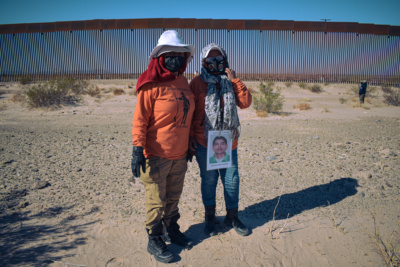 “The eyes don’t lie” repeats Ruth, a Salvadoran woman looking for her son in the city of Tijuana. She holds a large photograph of son Rafael, as two homeless men on the street watch her closely, searching their memories for a recollection of the face of the disappeared son. “He might have changed over the years, but the eyes don’t lie,” says the mother.
“The eyes don’t lie” repeats Ruth, a Salvadoran woman looking for her son in the city of Tijuana. She holds a large photograph of son Rafael, as two homeless men on the street watch her closely, searching their memories for a recollection of the face of the disappeared son. “He might have changed over the years, but the eyes don’t lie,” says the mother.
Ana Ruth Delandaverde has been searching for her son, Ernesto Rafael Valencia, since October 9, 2012. The day he disappeared, Rafael contacted her from Piedras Negras, Coahuila, after setting off from El Salvador to find “the American dream”. Ruth put out the word on social networks and found indications that her son could be in Tijuana, but until now she had no way of making the trip north to look for him.
“I thank God because on my own I couldn’t come looking for my son here, only now that the First International Search Brigade was created have I been able to come search for him,” she says. She pastes posters of his face and personal data on lampposts and walls. Along with dozens of mothers and relatives of disappeared persons, Ruth searched the streets of the two westernmost border states of Mexican territory–Sonora and Baja California.
The First International Search Brigade took place from February 16 to March 4, 2022 on Mexico’s northwest border. It arose as a collective effort of relatives from Mexico, Peru, Colombia, El Salvador and Honduras to search for their disappeared loved ones thought to be in this region. Local groups searching for Mexican disappeared had seen the urgent need to address the problem of migrant disappearances in the area, and decided to organize an International Brigade and invite family members from other countries to join forces.
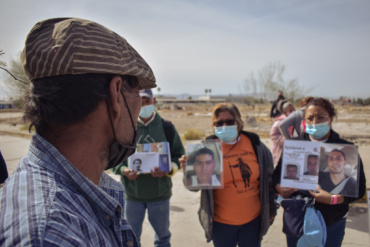 Mexico is a migration route that sees thousands of people cross every month and many lose communication with their loved ones
Mexico is a migration route that sees thousands of people cross every month and many lose communication with their loved ones
along the way. Some are forced to live on the streets or fall victim to trafficking. The conditions faced by Central American, Haitian, South American and African migrants in Mexico are extremely adverse. The states adjoining the border have become spaces inhabited by those who try to cross or have been deported. This has led many families to look for their children by asking in the streets of bordertowns, searching for clues to their whereabouts and information that will lead to finding them.
“Already being here I have realized that there are many people who are from other countries who stayed here and are now on the streets. As a mother, my heart aches. I know that each of them has a mother and that mother– in whatever country of the world– must be mourning the loss of her son. The children of any of us could be in any state and if the police weren’t chasing them here, they could return to their homes,” says Ruth, leaving the Tijuana outskirts, which serves as a meeting place for homeless people.
The fear that these people have of the police and authorities is palpable. They tell the mothers of the disappeared about the conditions they live in. They say that in Mexicali, the new governor of Baja California, Marina del Pilar Ávila Olmeda, ordered a “social cleansing” of the city center, which meant that they were forced to leave and flee state violence.
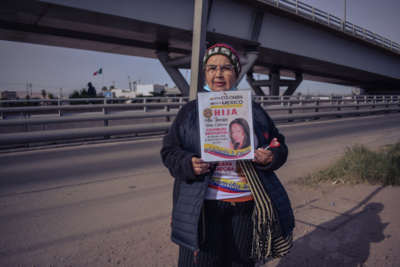 On Feb. 28, when the brigade was in the state capital, the governor visited the shelter where the families were staying. As soon as they saw her, the mothers rushed to express their pain and their experiences, and also their protests and requests. They demanded that they be allowed to enter the prisons to see the inmates face to face and not just their photographs. They reported some of their cases in which the prosecution claimed to have lost the evidence, and that families repatriating the bodies of their children found in mass graves were being charged fees. In Baja California, the official statistic shows 1,431 disappeared persons, however, the families told the governor that this figure is made up, since on repeated occasions the prosecutor’s office does not file reports of disappearances. In other words, the authorities are not opening investigation files for everyone who comes to report a disappearance.
On Feb. 28, when the brigade was in the state capital, the governor visited the shelter where the families were staying. As soon as they saw her, the mothers rushed to express their pain and their experiences, and also their protests and requests. They demanded that they be allowed to enter the prisons to see the inmates face to face and not just their photographs. They reported some of their cases in which the prosecution claimed to have lost the evidence, and that families repatriating the bodies of their children found in mass graves were being charged fees. In Baja California, the official statistic shows 1,431 disappeared persons, however, the families told the governor that this figure is made up, since on repeated occasions the prosecutor’s office does not file reports of disappearances. In other words, the authorities are not opening investigation files for everyone who comes to report a disappearance.
“In Colombia they don’t support me because they say that my girl disappeared here in Mexico and that this is where they have to respond. That’s why I joined the Brigade and the groups because the authorities haven’t been doing anything lately, they haven’t sent files on anything. I have to keep looking for my daughter, I cannot let her be forgotten”, states Luz Dary Calderón Zuluaga from Medellín, Colombia. Luz Dary is searching for her daughter Alía Vanessa Uruaga Calderón, who disappeared on November 30, 2013 in Morelia, Michoacán.
“Many mothers here in Mexico have adopted my daughter–whenever they go out searching they take her photograph too. I haven’t stopped looking for her since she disappeared. The first time I came alone, I had no knowledge of anything and didn’t know anybody,” says Luz Dary. She adds that the Brigade has allowed her to meet more people in a situation similar to hers.
“We feel like a family, with the same pain, all of us. And for me it has been a very special family.” Like Luz Dary, none of the foreigners who participated in the Brigade have received support from the governments of their countries and by not knowing how the institutions in this country operate, their rights are easily violated.
Mexico, dangerous territory for migrants
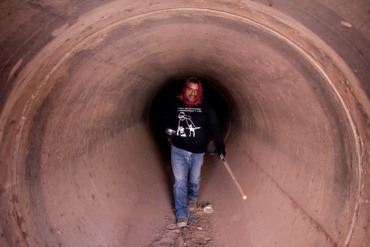 Mexico is not an easy territory to cross. Among the multiple problems faced by people in transit is the violence that grows every day. Based on the National Registry of Missing and Missing Persons in Mexico, there are reports of now more than 100,000 missing persons in the country.
Mexico is not an easy territory to cross. Among the multiple problems faced by people in transit is the violence that grows every day. Based on the National Registry of Missing and Missing Persons in Mexico, there are reports of now more than 100,000 missing persons in the country.
“My wife suffered so much because she went alone to meet with our government officials and they never listened to her. Then she found this group that has accompanied her step by step to find the most beloved thing in life,” says Jesús Garrido, as he climbs the hill with a shovel on his shoulder. “We as parents also have sensitivity and heart.” Jesús joined the Brigade to searching for his son with the same name, who was disappeared on Dec. 12, 2013 in Reynosa, Tamaulipas.
As he continues to search the hillside, Jesus tells us his story. Born in Michoacán, he moved to the State of Mexico at an early age. All his life he has worked as a cook and baker-he currently has a bakery in Coahuila. Nine years ago, her son Jesús Garrido Salas was “picked up” by a group and since then his family has been searching for him.
He comments that “It is not fair to cut off the dreams of our children, our parents, our sisters, our wives. We are afraid of going to a prosecutor’s office to say: ‘I have a problem, my son hasn’t shown up.’ And that they tell me that they’re very sorry, but they don’t have time right now. That’s what they told my wife. So we come to search, from place to place”.
Loaded with tools, a group of family members traipse into the border desert, the mountains and the ravines in search of clandestine graves, dug by criminal groups in the area, or the remains of those who have perished in their attempt to cross. The relatives say the roads, the hills and the deserts are like books: pages that one can read, listen to what the terrain has to say. A broken branch can be an indication of the passage of a person, a footprint can remain as a trace of the tired step of an entire group.
The countryside, the mountains, the paths and the bones speak to them and the people who search have had to learn to listen to them as they seek answers. Although the searchers often have no clue that their family member disappeared there, they search for all the disappeared people.
“Today a mother rests”, they comment when they discover remains. “When a loved one dies, we go to the grave to pray. What do we with the disappeared?”, Jesus asks, sitting on a boulder as the Brigade members examine the remains of an as yet unidentified person. “Every time we find a body, it goes through my mind and I feel that it is my son”.
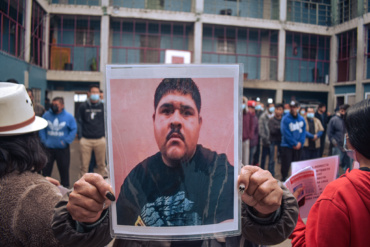 Lupita Sánchez, says that when she found her son she felt a certain peace of mind, “but the pain and the need to be with him never goes away.” She says she wishes that all her companions could find their children as she was able to do. “I want everyone to feel what I felt when I found my son,” she says. She adds that her other wish is that relatives of disappeared persons continue to unite.“I want to tell all the groups that we should all unite. We are united by the same pain of having a disappeared person and we have to join forces.” With words of thanks to all the people involved, on March 4, the First International Brigade closed with a farewell dinner. In unison the participants shouted “International Search Brigade, present now and always!”
Lupita Sánchez, says that when she found her son she felt a certain peace of mind, “but the pain and the need to be with him never goes away.” She says she wishes that all her companions could find their children as she was able to do. “I want everyone to feel what I felt when I found my son,” she says. She adds that her other wish is that relatives of disappeared persons continue to unite.“I want to tell all the groups that we should all unite. We are united by the same pain of having a disappeared person and we have to join forces.” With words of thanks to all the people involved, on March 4, the First International Brigade closed with a farewell dinner. In unison the participants shouted “International Search Brigade, present now and always!”
Photographs: Javier Perea



